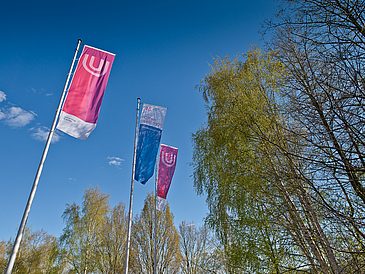The German Research Foundation is supporting 17 new research training groups throughout Germany over the next five years. Research training groups are institutions set up by universities to support researchers in the early stages of their careers. The focus is on the qualification of doctoral candidates within the framework of thematically focused research programs."The fact that the University of Bremen is involved in two of the seventeen approved research training groups nationwide not only demonstrates its own research strength. In both programs, the university cooperates with the University of Oldenburg. This fact once again underlines the close cooperation between the two universities, as is also evident in the joint application for the 'The Ocean Floor – Earth's Unchartered Interface' Excellence Cluster," says Professor Michal Kucera, Vice President for Research and Transfer at the University of Bremen.
Both research training groups come from the "Minds, Media, Machines" high-profile area, in which researchers from the University of Bremen cooperate with internal and non-university research institutions. The common goal is to advance research in areas such as artificial intelligence, robotics, machine learning, and data science – with a particular focus on the impact and benefits for society.
HEARAZ – Transforming Hearing Aids into Health Assistants
The DFG is supporting the HEARAZ (Hearable-centered Assistance: From Sensor to Participation) (“Hearable-zentrierte Assistenz: Vom Sensor zur Teilhabe”) research training group at the University of Oldenburg and the University of Bremen with around 6.5 million euros. HEARAZ brings together researchers from different disciplines, including doctoral students from the fields of computer science, physics, medicine and nursing science, neuroscience, care science, humanities, and social sciences. The focus is on different approaches to further developing hearing aids into so-called hearables, which accompany wearers through everyday life as health assistants. Brain waves recorded at the ear can provide information about alertness. Blood pressure and pulse can also be measured, as can a person's movements. The microphones of a hearable can register not only speech patterns and body sounds but also ambient noise. For example, the researchers would like to evaluate speech characteristics of hearing aid wearers, as cognitive changes, such as those that occur in dementia, have an influence on the way people speak. In addition to the medical and technical factors, the research team is also investigating the social and ethical issues associated with a health center worn on the ear.
At the co-applicant University of Bremen, the HEARAZ co-spokesperson Tanja Schultz, professor of cognitive systems, Karin Wolf-Ostermann, professor of nursing care research, and Haizhou Li, professor of computer science and U Bremen Excellence Chair of the "Minds, Media, Machines" high-profile area, are involved in HEARAZ.
CAUSE – How Technical Systems Should Provide Information about Their Processes
"CAUSE – Concepts and Algorithms for – and Usage of – Self-Explaining Digitally Controlled Systems" is a joint research training group of the Hamburg University of Technology, the University of Bremen, and the University of Oldenburg. It is supported by the DFG with around eleven million euros. The researchers' aim is to redesign cyber-physical systems in such a way that they can independently provide information about their own processes and possible errors. The term cyber-physical systems refers to objects that combine physical and digital elements. These include wind turbines, for example, which are equipped with numerous sensors to measure wind speed or wind direction. In their research, the doctoral students are concerned with the collection and transmission of information at all levels, both in terms of hardware and software. Specifically, they are developing a self-explanatory cyber-physical system using the example of a wind power plant. In the event of an error, for example, this system should independently determine where the source of the error lies and automatically and promptly generate an error message that is understandable and useful for users and developers.
Rolf Drechsler, professor of computer architecture and CAUSE co-spokesperson, Michael Beetz, professor of artificial intelligence, and Rainer Koschke, professor of software engineering, are participating in the research training group at the University of Bremen.
Contact:
Prof. Dr. Tanja Schultz
Faculty of Mathematics / Computer Science
University of Bremen
Phone: +49 421 218-64270
Email: tanja.schultzprotect me ?!uni-bremenprotect me ?!.de
Prof. Dr. Rolf Drechsler
Faculty of Mathematics / Computer Science
University of Bremen
Phone: +49 421 218-63932
Email: drechslerprotect me ?!uni-bremenprotect me ?!.de

